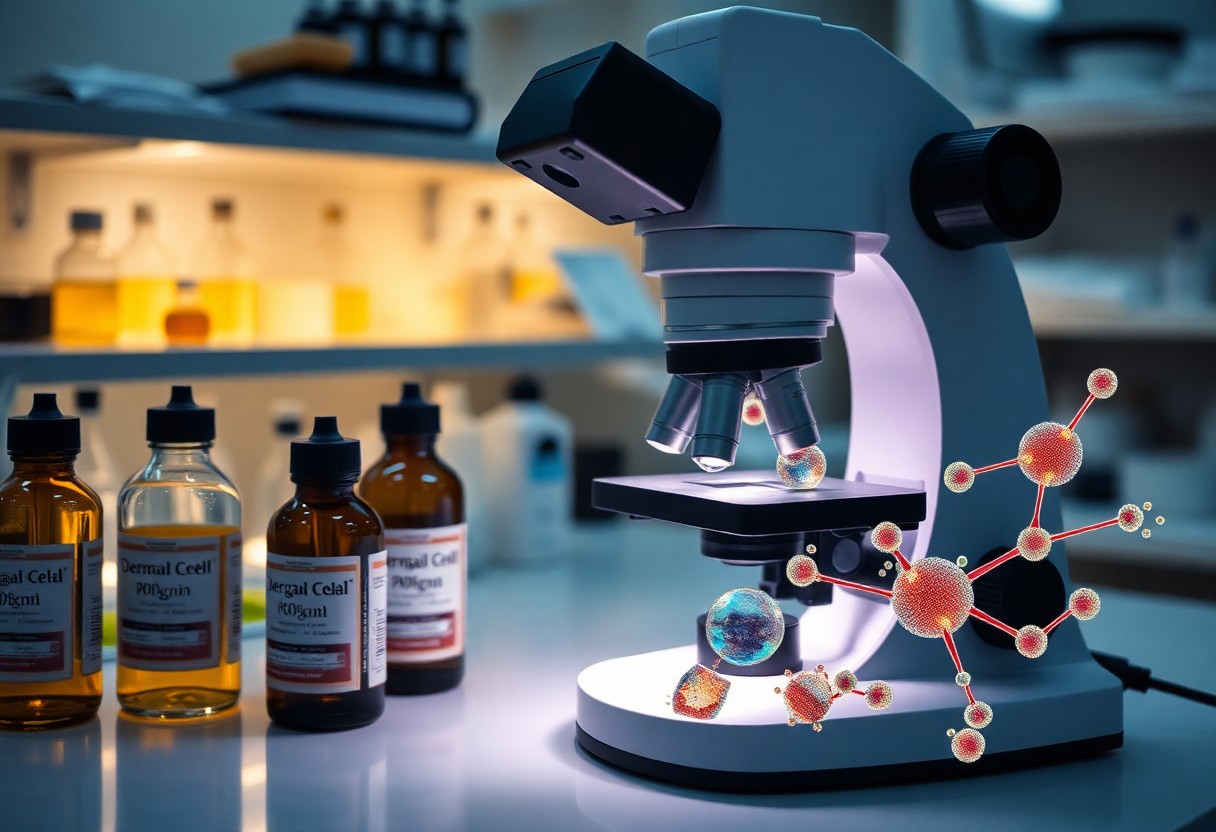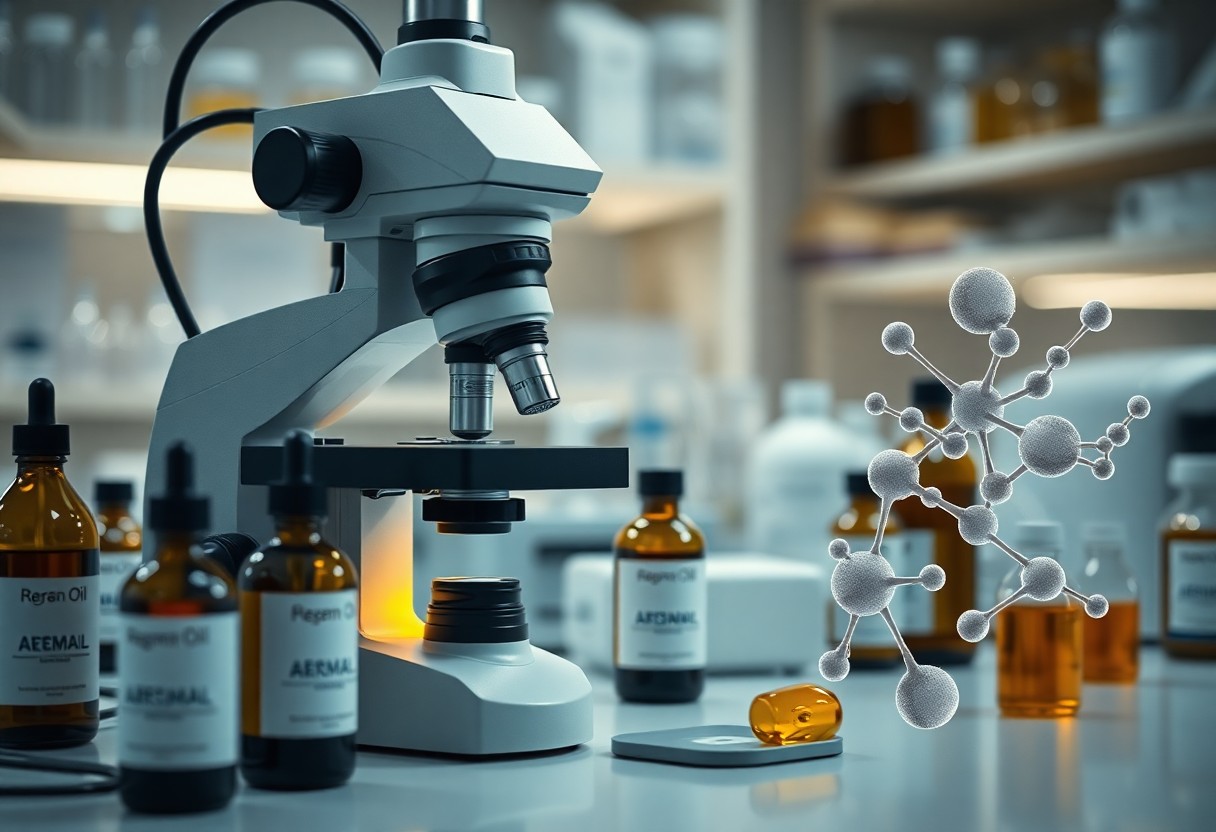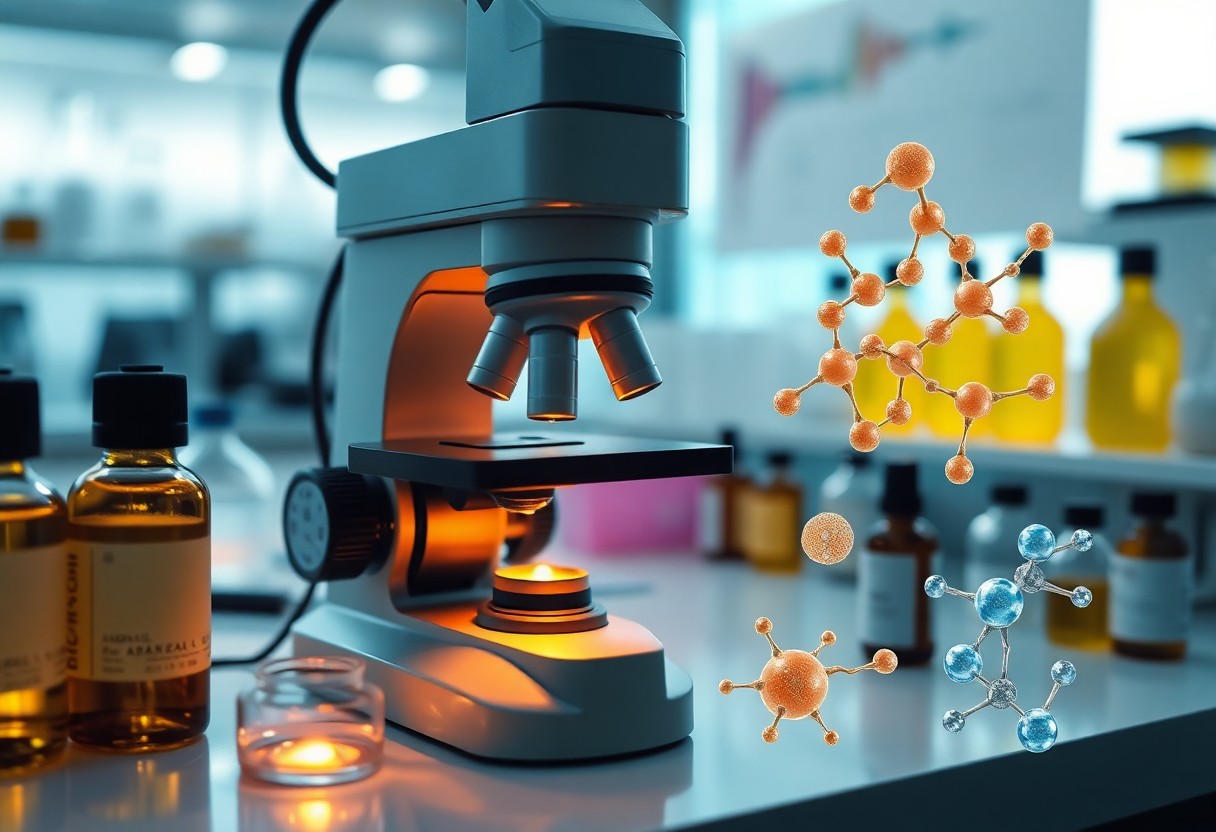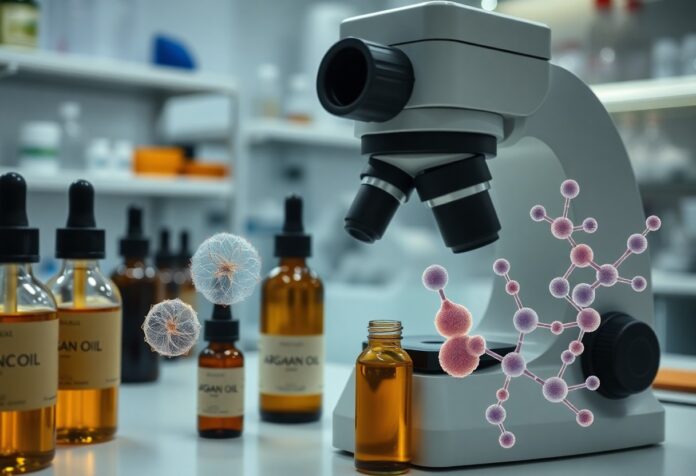Just as the universe thrives on the intricate balance of forces, your skin requires the right elements to combat oxidative stress. In this post, you will explore how the polyphenolic content of argan oil can play a significant role in protecting your dermal cells from oxidative damage. By understanding the science behind these powerful compounds, you can make informed decisions to enhance your skin’s health and resilience. Dive into the research and discover how you can harness nature’s ingenuity for your own benefit.

Key Takeaways:
- Polyphenolic Content: Argan oil is rich in polyphenols, which are powerful antioxidants that can help combat oxidative stress in dermal cells.
- Oxidative Stress: This condition occurs when there is an imbalance between free radicals and antioxidants in the body, potentially leading to skin damage.
- Dermal Cells Protection: The antioxidants present in argan oil play a significant role in protecting dermal cells from damage caused by oxidative stress.
- Skin Health Improvement: Regular application of argan oil may contribute to improved skin health and resilience against environmental stressors.
- Potential Therapeutic Use: The findings suggest that argan oil could serve as a natural therapeutic option in skincare formulations targeting oxidative stress and related skin conditions.

How-To Utilize Argan Oil
Selecting Quality Argan Oil
Your journey toward integrating argan oil into your skincare regimen begins with the selection of high-quality oil. This process is vital, as the efficacy of argan oil largely depends on its purity and origin. Look for cold-pressed products that are labeled as 100% pure argan oil, as this method preserves the polyphenolic compounds and beneficial fatty acids that contribute to its antioxidant properties. Take note of the packaging; high-quality argan oil often comes in dark glass bottles to protect it from light, which can degrade the oil over time. Furthermore, checking for third-party certification can guide you in choosing a reputable brand.
Little details, such as the aroma and color of the oil, can also provide indicators of its quality. Quality argan oil typically has a golden hue and a nutty scent, whereas inferior oils may exhibit a pale yellow color or an unpleasant smell due to the presence of rancidity. It is prudent to conduct a little research on the brands you are considering and seek organic options that ensure sustainable and ethical sourcing practices.
Methods of Application
You can embrace the benefits of argan oil in various applications tailored to your skincare needs. One common method is to apply a few drops directly onto damp skin after cleansing. This helps to lock in moisture and provides a nourishing base for any additional products you may use. Alternatively, you can mix a few drops of argan oil into your regular moisturizer or foundation to augment their hydrating effects. For a more intensive treatment, consider using it as a night serum, allowing the oil to work its magic as you sleep, providing your skin with deep nourishment throughout the night.
HowTo properly apply argan oil can enhance its effectiveness and your overall skincare experience. For maintaining healthy hair, consider applying a small amount of argan oil to the tips of your hair to address dryness and split ends. It’s best to use it sparingly to avoid an overly greasy appearance, ensuring you find a balance that works for your individual needs. Whether you choose to apply it to your skin, hair, or even nails, incorporating argan oil into your routine can lead to notable improvements in hydration and overall skin health.

Tips for Enhancing Polyphenolic Absorption
While the polyphenolic compounds in argan oil offer potential protective benefits against oxidative stress, enhancing their absorption is equally important to maximize their efficacy. By adopting a few strategies, you can significantly improve how well your body absorbs these beneficial nutrients. Consider the following tips:
- Combine argan oil with a source of healthy fats, like avocados or nuts, to facilitate better absorption.
- Consume it alongside vitamin C-rich foods, which can enhance the bioavailability of polyphenols.
- Choose an organic form of argan oil to ensure it is free from harmful pesticides that can inhibit absorption.
- Utilize gentle heating methods, as high heat can degrade polyphenolic content.
Thou must take these small yet significant actions to cultivate an environment within your body that fosters optimal absorption.
Optimal Timing for Use
Now that you have a grasp of how to enhance polyphenolic absorption, it is equally important to consider the optimal timing for integrating argan oil into your routine. The circadian rhythm plays a role in how your body metabolizes nutrients, and strategically timing your intake can influence its benefits. Consuming argan oil in the morning may offer a refreshing start to your day, while using it at night may complement your body’s repair processes during sleep.
Furthermore, if you are engaging in activities that may induce oxidative stress, such as intensive exercise or exposure to pollution, consider incorporating argan oil around these times. By aligning your intake with your lifestyle, you empower your body to harness the protective properties that argan oil has to offer.
Complementary Ingredients
Clearly, the synergy between argan oil and other ingredients can amplify the positive outcomes for your dermal cells. Leveraging complementary ingredients such as fruits, vegetables, and spices can create an environment conducive to maximizing the effectiveness of polyphenolic compounds. For instance, turmeric contains curcumin, known for its anti-inflammatory properties, which when combined with argan oil can provide a formidable defense against oxidative stress.
Another noteworthy combination is the blend of argan oil with foods rich in omega-3 fatty acids, such as fatty fish or flaxseeds. Omega-3s are known for their anti-inflammatory properties and can enhance the body’s ability to cope with oxidative stress. The interplay of these nutrients not only complements the action of argan oil but also elevates your overall nutrient profile, optimizing your skin’s resilience to environmental challenges.
Factors Influencing Oxidative Stress in Dermal Cells
All biological systems function optimally under specific conditions, and your dermal cells are no exception. Numerous factors can escalate oxidative stress, which, if unmitigated, can lead to cellular dysfunction and skin disorders. Understanding these factors allows you to cultivate a healthier skin environment. Here are some key contributors to oxidative stress in your dermis:
- Environmental pollutants
- UV radiation exposure
- Diet and nutritional habits
- Genetic predisposition
- Emotional stress
Any of these factors can synergistically interact, amplifying oxidative damage to your skin cells.
Environmental Influences
There’s a vast array of environmental elements that can impact the oxidative balance within your skin. When you consider factors such as air pollution, smoke, and UV radiation, their effects can be particularly pronounced. The exposure to free radicals generated by these external stressors can lead to cellular harm and premature aging of your skin.
Moreover, you might be surprised to learn that even indoor pollution can contribute to oxidative stress. Common household chemicals and toxins, alongside volatile organic compounds, can invade your living spaces, further impacting your skin’s health. Therefore, recognizing and minimizing these environmental influences is vital for maintaining the integrity of your dermal cells.
Lifestyle Choices
One of the most profound ways you can influence oxidative stress is through your lifestyle choices. Choices regarding diet, exercise, sleep, and stress management play imperative roles in how your skin ages and reacts to oxidative challenges. For instance, a diet rich in antioxidants can neutralize free radicals, lessening their ability to cause harm to your skin cells.
The commitment to an active lifestyle not only enhances your overall health, but it also improves blood circulation, promoting the delivery of nutrients to your skin, which can mitigate oxidative stress. Quality sleep is equally paramount, as it allows your body to repair and rejuvenate cellular structures. By evaluating and optimizing your lifestyle choices, you can pave the way for healthier skin and reduce the toll of oxidative stress.
Understanding Polyphenolic Properties
Many studies emphasize the remarkable properties of polyphenols found in Argan oil, particularly in their ability to combat oxidative stress in dermal cells. These plant-derived compounds exhibit antioxidant properties, which can neutralize free radicals and reduce cellular damage. For instance, Two Argan Oil Phytosterols, Schottenol and Spinasterol, have garnered attention for their unique structure and potential health benefits, further advancing our understanding of how these compounds operate on a cellular level. The polyphenolic compounds present in Argan oil may modulate various biochemical pathways, ultimately contributing to healthier skin by enhancing resilience against oxidative damage.
Mechanisms of Action
If you probe deeper into the mechanisms of action of polyphenols, it becomes evident that they can influence the expression of genes related to oxidative stress response. By upregulating protective enzymes and downregulating pro-oxidant activities, these compounds fundamentally alter the cellular environment to favor survival against oxidative challenges. This genome modulation not only enhances the cellular defense mechanisms but also promotes overall cellular health, thereby revealing polyphenols’ multifaceted roles in skin care.
Comparisons with Other Antioxidants
Even in a landscape filled with various antioxidants, polyphenols from Argan oil stand out for their specific and potent roles in mitigating oxidative stress. To appreciate their uniqueness, consider the following comparison:
| Antioxidant Source | Mechanism of Action |
| Vitamin C | Scavenges free radicals, imperative for collagen synthesis. |
| Vitamin E | Protects cell membranes from lipid peroxidation. |
| Polyphenols (Argan Oil) | Modulate gene expression, enhance cellular antioxidant defenses. |
Another aspect worth noting is the significant synergy when combining polyphenols with other antioxidants. This interplay can create an amplified effect, optimizing skin protection from oxidative stress. For example, the potent action of polyphenols in Argan oil can work harmoniously with vitamins C and E, resulting in a more comprehensive defense mechanism against environmental stressors. Such combinations provide an excellent opportunity to nourish your skin safely and effectively, showcasing that while each antioxidant possesses unique attributes, their collaborative actions may yield superior outcomes.
| Combination | Potential Benefits |
| Polyphenols + Vitamin C | Enhanced collagen production, broader radical scavenging. |
| Polyphenols + Vitamin E | Improved cell membrane protection, better absorption rates. |
Assessing the Efficacy of Argan Oil
For individuals seeking to enhance skin health, the assessment of argan oil’s effectiveness is multifaceted. It is imperative to examine various studies investigating the inherent benefits of its polyphenolic compounds. Research, such as the findings outlined in the article on the modulatory effects of the addition of argan and olive oils on skin health, demonstrates that these compounds may play significant roles in reducing oxidative stress within dermal cells. By exploring the biochemical pathways, you may begin to uncover the potential of argan oil to bolster your skin’s resilience against environmental challenges and aging processes.
Signs of Improvement
Clearly, users of argan oil often report visible improvements in skin texture and hydration levels. As the oil penetrates the skin barrier, your cells may experience a transformative boost in moisture retention, leading to a more supple appearance. Moreover, with regular usage, you might observe a reduction in inflammatory signs and an enhanced ability to combat oxidative damage, suggesting that argan oil acts not merely as a topical moisturizer but as a protective shield for your skin.
Longevity of Effects
With consistent application of argan oil, many individuals notice that the benefits extend beyond immediate enhancements. The cumulative effects seem to suggest that your skin can maintain improved hydration and resilience over time, even in the face of environmental aggressors. This enduring impact might be attributed to the oil’s complex composition, which continues to work at a cellular level, facilitating ongoing repair and protection.
Improvement in skin health from argan oil may appear to be a gradual process; however, the advantages can indeed demonstrate longevity. When you integrate argan oil into your daily skincare regimen, it may develop a compounding effect over time, maintaining your skin’s vitality and mitigating the signs of aging. Thus, by remaining patient and consistent in your efforts, you can potentially enjoy a long-lasting radiance that reflects deeper resilience against oxidative stress.
Potential Side Effects and Considerations
Now, while argan oil boasts a plethora of benefits stemming from its rich polyphenolic content, it is crucial to approach its usage with a discerning mind. You may begin your exploration of this natural wonder by reviewing The Potential Role of Major Argan Oil Compounds as Nrf2, which elucidates how these compounds may interact with your cellular pathways. However, as with any therapeutic agent, potential side effects warrant your attention. Although largely considered safe for topical use, some individuals may experience irritation or discomfort upon initial application, particularly those with sensitive skin types. It is prudent for you to patch test any new product on a small area before widespread application to ensure your skin tolerates it well.
Allergic Reactions
Clearly, allergic reactions pose a significant consideration when introducing argan oil into your skincare regimen. Although infrequent, some individuals may find that they react adversely to argan oil due to its organic compounds. You might notice symptoms such as redness, itching, or pustular lesions on your skin. Therefore, should you have a known allergy to nuts, be particularly vigilant, as argan oil is derived from the nuts of the argan tree. Ensuring you familiarize yourself with the ingredient list on your purchased products is advisable in mitigating allergic reactions.
Interactions with Other Treatments
One aspect you ought to consider is how argan oil may interact with other treatments you are currently using. If, for example, you are leveraging topical retinoids or exfoliating agents, the moisturizing properties of argan oil could either enhance or hinder the effectiveness of these products. It would be wise to establish a well-structured skincare routine, spacing out the application times of your treatments to avoid any potential conflicting effects and to observe how your skin responds to the combined application.
Potential interactions also extend to oral medications that you might be prescribed. In particular, those aiming to manage conditions such as acne or psoriasis could experience variability in treatment effects when combined with argan oil’s rich nutrient profile. Hence, engaging in an open discourse with your healthcare provider about your intentions to use argan oil alongside your treatments will empower you to make informed decisions that consider the complexities of your individual skin health.
Summing up
With this in mind, you should consider the compelling evidence surrounding the polyphenolic content of argan oil and its potential to combat oxidative stress in dermal cells. The scientific community continues to reveal the intricate mechanisms by which polyphenols work at a cellular level, offering you fascinating insights into the relationship between natural compounds and skin health. You find yourself at the intersection of biology and beauty, where understanding the science enriches your appreciation for these natural substances and their roles in promoting wellness.
Your exploration of argan oil’s benefits extends beyond mere anecdotal claims; it invites you to engage with a body of research highlighting the significance of antioxidants in skin care. By embracing this knowledge, you empower yourself to make informed choices that align with your health and beauty goals. As you ponder the implications of oxidants and antioxidants in your life, the potential for argan oil to serve as a protective agent becomes an exciting avenue for further inquiry and personal application.
FAQ
Q: What is the role of polyphenolic compounds in Argan oil?
A: Polyphenolic compounds in Argan oil play a significant role in combating oxidative stress. They are powerful antioxidants that can protect dermal cells from harmful free radicals, which are unstable molecules that can damage cellular structures, leading to premature aging and various skin conditions. By neutralizing these free radicals, polyphenolics help maintain skin health and improve its appearance.
Q: How does oxidative stress affect dermal cells?
A: Oxidative stress occurs when there is an imbalance between free radicals and antioxidants in the body, leading to cellular damage. In dermal cells, this can result in inflammation, loss of elasticity, and accelerated aging. Oxidative stress has also been implicated in various skin disorders, making it imperative to support skin cells with antioxidants like those found in Argan oil.
Q: Can Argan oil be beneficial for all skin types?
A: Yes, Argan oil is generally suitable for all skin types due to its lightweight texture and non-comedogenic properties. Its polyphenolic content can provide benefits to dry, oily, and sensitive skin by helping to hydrate, reduce inflammation, and protect against oxidative stress. However, individuals with specific skin concerns should perform a patch test before widespread use.
Q: How can I incorporate Argan oil into my skincare routine?
A: Argan oil can be used in various ways within a skincare routine. It can be applied directly to the skin as a moisturizer, added to creams or serums for enhanced antioxidant protection, or used as a facial oil after cleansing. For the best results, it is advisable to apply Argan oil to damp skin to lock in moisture and maximize its benefits.
Q: Are there any potential side effects of using Argan oil on the skin?
A: While Argan oil is generally considered safe for topical use, some individuals may experience allergic reactions or irritation, particularly those allergic to nuts. It’s vital to conduct a patch test by applying a small amount of Argan oil to a discreet area of skin before incorporating it into a regular skincare routine. If any adverse reaction occurs, discontinue use and consult a healthcare professional.

